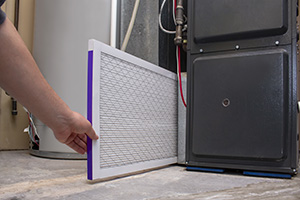Air filters for furnaces can be a confusing myriad of options. There are different ratings, different materials, and different sizes. As an average homeowner, how do you know which one to choose? Which one is right for your home and your furnace? Selecting the right filter greatly impacts how often you need Spring Lake furnace service. With winter approaching and many people doing the right thing and checking their filters on their furnace to see if it is time to for replacing, it seems like a good time to review your options.
A Spring Lake furnace service technician can help you select the right one

Filters are made from different materials which affect their cost, performance, and rating. The MERV (minimum efficiency reporting value) scale rates furnace filters. The lower the number, the less filtering the product does. Similar types of filters are often given the same rating range based on the material the filter uses.
Here are the basics of different filter types:
Fiber Glass
- The lowest grade filters are disposable fiberglass filters. They are extremely cheap so if the cost is the only thing you are considering, these are a good option. However, you need to take into account that because they do not remove little else from the air other than dust. Their MERV rating is typically in the range of 1-4. If you have no one in the home with allergies or immune issues, these may be just fine for you.
Electrostatic
- Next up is electrostatic filters. These filters are washable and can be used as a permanent solution. Because of this, they also come with a higher price tag, but they almost never need to be replaced. They work by producing a positive charge which attracts air particle to the filter. You can rinse off the filter with your garden hose, let it dry, and put it right back in. They are 97% effective in removing particles from the air, however, they do not rate on the MERV scale because they are not a dry media filter.
HEPA
- HEPA filters are another type. HEPA stands for High-Efficiency Particulate Air and was originally designed during World War II to safeguard researchers while working on the atomic bomb. That gives you a good idea of how much these filters remove from the air! The ability to remove almost 99% of small particulates out of the air also means they greatly hamper airflow. It is best to check with a furnace service repairman to see if your furnace can handle the extra work required to function with a HEPA filter.
Pleated
- Pleated filters are a mid-range filter. Usually in the range of 5-12 on the MERV scale, they work better than non-pleated fiberglass filters, but not as well as HEPA. Their life span can be slightly longer than the less expensive option as well.
With so many options on the market, it can be overwhelming. If you still don’t know which filter is best for your furnace, call an expert. A Spring Lake furnace service technician can help guide you through the selection process and help you choose the best option for you.
More on Spring Lake Furnace Service and Filters
When it comes to maintaining an efficient and healthy HVAC (Heating, Ventilation, and Air Conditioning) system in your home, one of the most critical components to consider is the air filter. The air filter’s primary role is to trap dust, pollen, pet dander, and other airborne particles. They prevent them from circulating throughout your home. However, not all filters are created equal. Using one with a rating that is either too high or too low for your system can lead to significant issues.
A filter with a MERV rating that is too low may not effectively capture harmful particle. This can lead to poor air quality and potential health issues for occupants. It also allows dust and debris to accumulate within the HVAC system. The result is reduced efficiency and potentially damages over time requiring more furnace repair.
Conversely, a filter with a MERV rating that is too high for your system is also problematic. High-efficiency filters are denser and significantly restrict airflow. This restriction forces the HVAC system to work harder to circulate air, leading to increased energy consumption and higher utility bills. Moreover, the added strain on your system can lead to premature wear and tear on components, resulting in costly repairs or even early system failure.
Finding the right MERV rating for your HVAC system is crucial for balancing air quality with system efficiency. The right filter will capture harmful particles effectively without impeding airflow, maintaining optimal indoor air quality and system performance. It’s advisable to consult with a Spring Lake furnace service professional to determine the most appropriate filter rating for your system. By choosing the correct filter, you not only protect your health and comfort but also safeguard your investment in your HVAC system, ensuring it runs efficiently for years to come.
